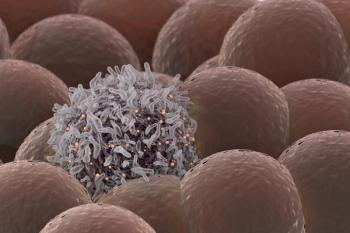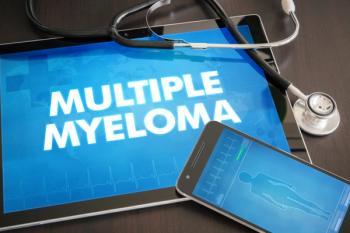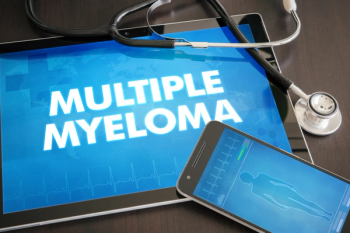
The drug combination reduced the risk of disease progression by 34% versus the standard of care in first-line metastatic castration-resistant prostate cancer, clinical trial results show.

The drug combination reduced the risk of disease progression by 34% versus the standard of care in first-line metastatic castration-resistant prostate cancer, clinical trial results show.

Cohort H of the phase 1b/2 EV-103 trial enrolled patients with MIBC who were eligible for surgical treatment but ineligible for cisplatin-based chemotherapy.

Dalpiciclib added to fulvestrant (Faslodex) was found to significantly prolong progression-free survival compared with fulvestrant monotherapy in patients with hormone receptor–positive, human epidermal growth factor receptor 2-negative advanced breast cancer.

Just 2 of 41 nutritionists interviewed reported using a validated screener, while 4 others said they use other tools, such as screening questions developed by other organizations, results show.

FDA to evaluate adagrasib for the treatment of patients with non–small cell lung cancer with tumors that have a KRAS G12C mutation.

Results of CheckMate-9ER trial in first-line advanced renal cell carcinoma will be featured in 2 poster presentations at the American Society of Clinical Oncology 2022 Genitourinary Cancers Symposium.

The common-weight loss plan synergizes with chemotherapy to triple survival time compared with the treatment alone in rigorous mouse models of PDAC, the analysis shows.

The drug pipeline is insufficient to meet the threat of antimicrobial resistance, and policy reforms are critically needed, according to the Biotechnology Innovation Organization.

All the participants were in the Beating Lung Cancer in Ohio study, which started before the COVID-19 pandemic.

Niraparib is associated with increased progression-free survival, regardless of the presence or absence of BRCA gene mutations.

The use of these services in oncology is likely here to stay.

The drug's novel molecular structure may result in fewer toxic adverse effects.

A variety of drugs from several medication classes are under investigation.

Study shows that treatment with rituximab (Rituxan) for B-cell non-Hodgkin lymphoma prior to COVID-19 vaccination significantly lowered the number of patients who developed blocking antibodies for the virus.

An emerging focus is aligning targeted, safe, and effective therapies with patient goals.

Ixazomib (Ninlaro, Takeda) has been found to improve survival in patients with multiple myeloma who have not undergone autologous stem cell transplant.

Larotrectinib was the first drug to receive accelerated FDA approval for patients of all ages based on a common molecular marker, independent of tissue origin for targeted therapy.

Applying these findings in practice could improve clinicians’ ability to offer truly personalized cancer therapy by enabling consideration of toxicity along with other data predicting patients’ responses.

Selinexor demonstrated a 37% increase in probability that patients treated with the drug will be in remission at 12 months.

The uncommon disease shares features of both lymphoma and myeloma.

Culturally tailored patient navigation can improve underserved individuals’ health literacy, trust in the health care system, and use of cancer screening tools, study results show.

The results of a pilot program investigating the efficacy of remote patient monitoring for patients with cancer showed that it helped to keep high-risk individuals out of the hospital.

Communication, flexibility, and virtual solutions will remain key as the COVID-19 pandemic continues.

Effective specialty pharmacies learn to meet the changing needs of patients and stakeholders.

The industry has been ushered into a new age of medicine.

Trametinib emerged as a novel therapeutic approach for low-grade serous carcinoma due to a high prevalence of activating mutations in the mitogen-activated protein kinase signaling pathway.

New study results show that the drugs, which block estrogen production, are more effective for premenopausal and postmenopausal women.

The research team looked at tumor samples, CT scans, and immune markers from the patients, finding that those who had taken part in the exercise program showed a better response to the chemotherapy.

Stuart Staggs, senior director of strategic programs at McKesson, discussed the encouraging metrics associated with use of the Oncology Care Model (OCM) sponsored by the Centers for Medicare and Medicaid Services.

As for different ways for oncology patients to move past their difficult post care treatments, Dr. Carmichael described multiple options, such as acupuncture, cancer rehab, and general meditation.